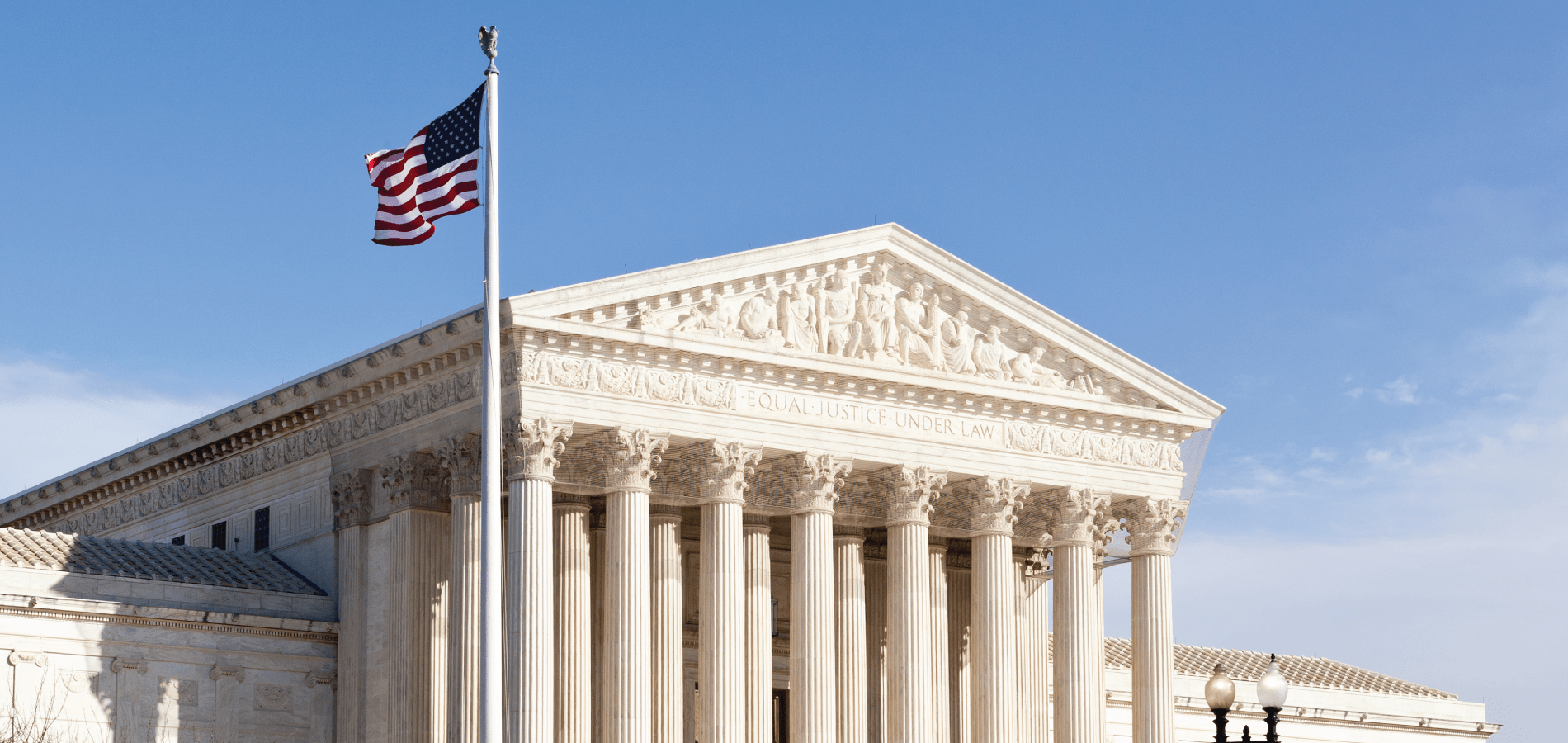On June 24, 2022, the Supreme Court ruled in Dobbs v. Jackson[1]19-1392 U.S. Reports 1 (2021)
Dobbs, State Health Officer of the Mississippi Department of Health, et al. v. Jackson Women’s Health Organization et al. This slip opinion can be found in HeinOnline’s U.S. Supreme Court Library. to overturn Roe v. Wade,[2]Roe et al. v. Wade, District Attorney of Dallas County, 410 U.S. 113, 178 (1973). This case can be found in HeinOnline’s U.S. Supreme Court Library. the court case that had established a constitutional right to an abortion. Since the decision, abortion has become a state issue, with state and even local governments now able to establish rules and regulations regarding whether a pregnant person can receive an abortion, and if so, under what conditions. Especially over the past few months, several states have updated their laws regarding abortion access. Using HeinOnline, let’s take a look at some of this new legislation.
State Laws: Access Restrictions
Florida
Florida recently passed a bill that would ban abortion after six weeks of pregnancy, except in the case that an abortion is needed to save the pregnant person’s life. Pregnancies from rape or incest must be aborted before 15 weeks, and the pregnant person must provide documentation, such as a police report.
Under previous legislation, abortion was allowed in Florida up to 15 weeks.[3]2022 Vol. 1 Pt. 1 484 (2022)
Chapter 69. This law can be found in HeinOnline’s Session Laws Library. This law has been under a legal challenge, and therefore the six-week ban won’t go into effect unless the previous 15-week law is upheld.
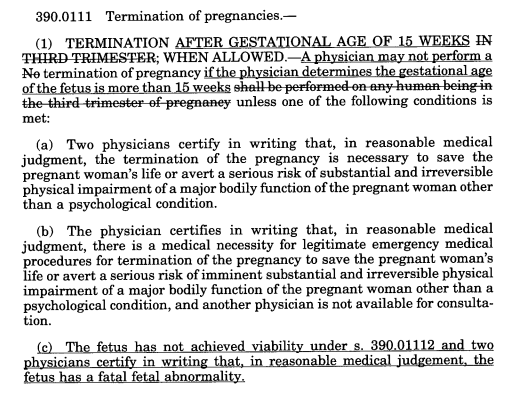
North Carolina
The North Carolina legislature has approved a ban on almost all abortions after 12 weeks, reduced from the current law of 20 weeks.[4]1 2015 135 (2015). This law can be found in HeinOnline’s Session Laws Library. The law allows abortion up to 20 weeks in the case or rape or incest, and 24 weeks for any “life-limiting” physical or genetic disorders. There is an exception for saving the life of the pregnant person.
Additionally, the proposed bill suggests putting $160 million toward child care access, maternal health care, foster programs, and contraceptives for low-income or uninsured parents. The law also instates new stricter licensing requirements for surgical abortion clinics.
The governor of North Carolina has vowed to veto any anti-abortion legislation, but the state Senate and House are likely to override that veto.

Montana
The governor of Montana recently signed a bill that states that the right to privacy guaranteed in the state’s constitution does not apply to having an abortion. It also prohibits abortion beyond the point of viability, which is defined as no later than 24 weeks. Additionally, the pregnant person must have an ultrasound before receiving an abortion.
Prior authorization will now be required for Medicaid to cover abortions due to rape, incest, or for the health of the pregnant person. The patient’s physician must document the gestational age, the reason for the abortion, and the number of pregnancies and children the patient has had. Furthermore, the law requires medical providers to give life-saving care to any baby born alive after an attempted abortion.


Wyoming
Wyoming has passed a law that bans all abortions except in the case of a rape or incest that was reported to the police, or when the pregnant person’s life is in danger.[7]2022 Budget Session, 2021 Special Session 305 (2022) Chapter 88. This law can be found in HeinOnline’s Session Laws Library. However, this legislation is currently on hold due to a lawsuit. Wyoming is also the first state to ban abortion pills. This ban is set to go into effect in July.
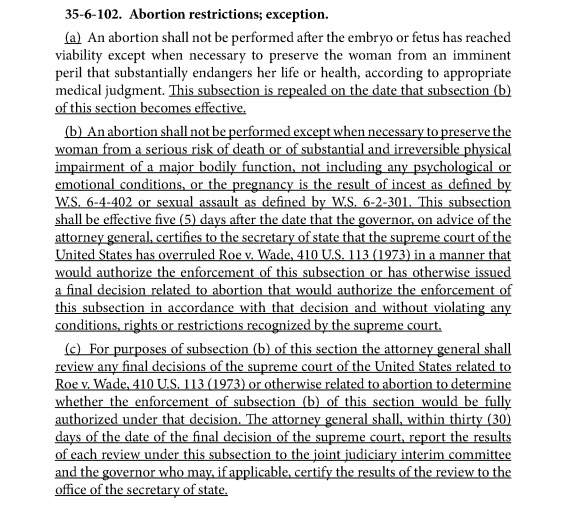
State Laws: Access Expansions
Maryland
The governor of Maryland recently signed a law that protects access to abortion and gender-affirming care in the state. The law would also protect people traveling to Maryland from other states to obtain an abortion from being forced to cooperate in criminal investigations.
Oregon
Representatives in Oregon have also passed a bill to protect abortion rights and gender-affirming care. However, a boycott by many Republican members of the Oregon Senate has prevented this legislation from proceeding.
Michigan
The governor of Michigan is expected to sign legislation that would ban companies from retaliating against any employee who has an abortion. She also recently signed legislation that repeals an abortion ban established in 1931.[8]1931 624. This law can be found in HeinOnline’s Session Laws Library.
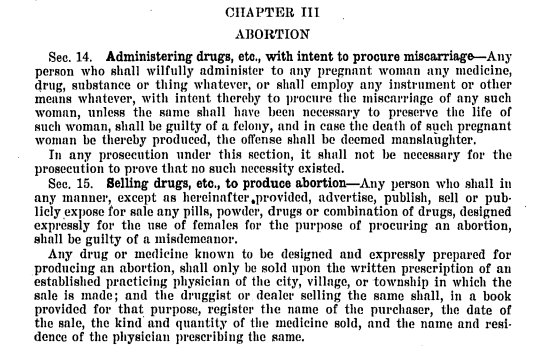
At the Federal Level…
The federal government has completed an investigation into two hospitals in Kansas and Missouri, both of which refused to provide an emergency abortion to a woman whose life was put at risk when her water broke at 17 weeks. The fetus would not survive, but both hospitals refused to perform the abortion because cardiac activity was still detectable. The investigation ruled that the hospitals violated the Emergency Medical Treatment and Labor Act (EMTALA).[9]To provide for reconciliation pursuant to section 2 of the first concurrent resolution on the budget for fiscal year 1986 (S. Con. Res. 32, Ninety-ninth Congress)., Public Law 99-272, 99 Congress. 100 Stat. 82 (1986). This act can be found in … Continue reading
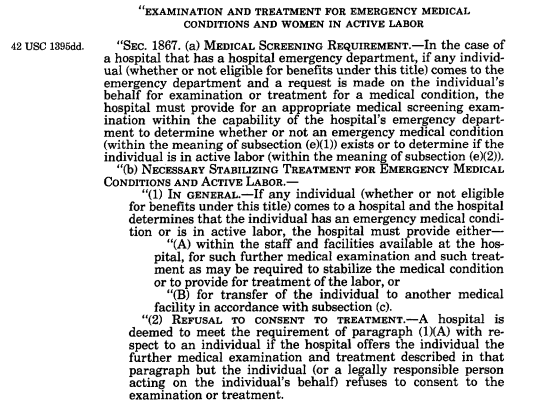
Additionally, the battle surrounding the abortion medication mifepristone continues. A federal judge in Texas last month issued a ruling that would have revoked the Food and Drug Administration’s approval of the pill. However, the Supreme Court temporarily blocked the decision. Currently, abortion clinics in Virginia, Montana, and Kansas are suing the FDA to force them to drop restrictions on how mifepristone can be prescribed. This medication is also used off-label to evacuate miscarriages.
Continue Following This Quickly Changing Topic with HeinOnline
New laws regarding abortion access and restriction are being proposed, voted on, and passed across different states constantly. You can follow what’s happening in various HeinOnline databases.
For analysis of upcoming Supreme Court cases regarding abortion, including access to abortion medication, check out Preview of U.S. Supreme Court Cases.
Additionally, head to our Law Journal Library, where you can use our PathFinder Tool to view nearly 10,000 journal articles about abortion.
Or, compare and contrast state laws on abortion with National Survey of State Laws.
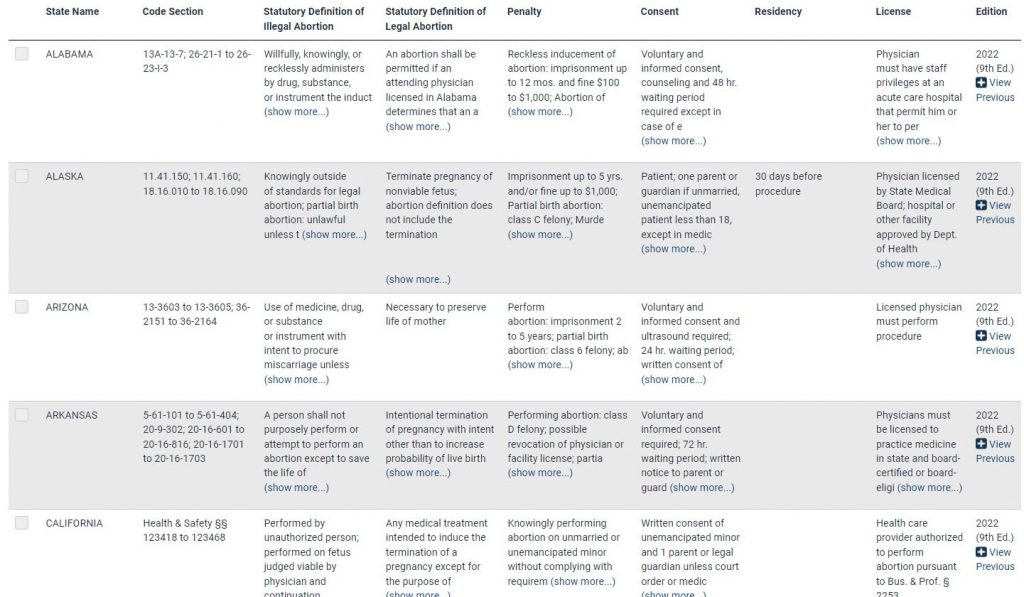
And, of course, subscribe to the HeinOnline Blog to get posts on new laws, history, government, true crime, and much more delivered straight to your inbox!
HeinOnline Sources[+]
| ↑1 | 19-1392 U.S. Reports 1 (2021) Dobbs, State Health Officer of the Mississippi Department of Health, et al. v. Jackson Women’s Health Organization et al. This slip opinion can be found in HeinOnline’s U.S. Supreme Court Library. |
|---|---|
| ↑2 | Roe et al. v. Wade, District Attorney of Dallas County, 410 U.S. 113, 178 (1973). This case can be found in HeinOnline’s U.S. Supreme Court Library. |
| ↑3 | 2022 Vol. 1 Pt. 1 484 (2022) Chapter 69. This law can be found in HeinOnline’s Session Laws Library. |
| ↑4 | 1 2015 135 (2015). This law can be found in HeinOnline’s Session Laws Library. |
| ↑5 | 2021 vol. II 983 (2021) Chapter No. 307. This law can be found in HeinOnline’s Session Laws Library. |
| ↑6 | 2021 vol. II 985 (2021) Chapter No. 308. This law can be found in HeinOnline’s Session Laws Library. |
| ↑7 | 2022 Budget Session, 2021 Special Session 305 (2022) Chapter 88. This law can be found in HeinOnline’s Session Laws Library. |
| ↑8 | 1931 624. This law can be found in HeinOnline’s Session Laws Library. |
| ↑9 | To provide for reconciliation pursuant to section 2 of the first concurrent resolution on the budget for fiscal year 1986 (S. Con. Res. 32, Ninety-ninth Congress)., Public Law 99-272, 99 Congress. 100 Stat. 82 (1986). This act can be found in HeinOnline’s U.S. Statutes at Large. |


